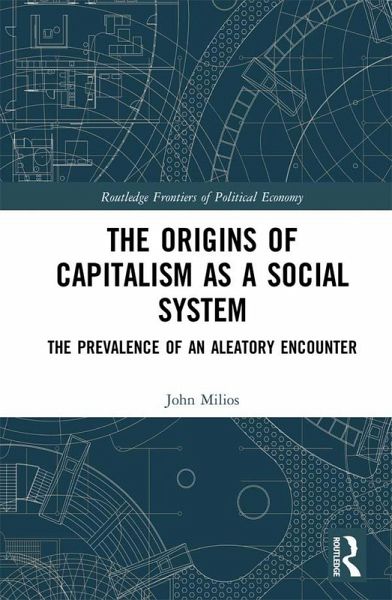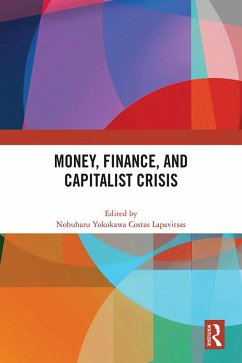
The Origins of Capitalism as a Social System (eBook, PDF)
The Prevalence of an Aleatory Encounter
Versandkostenfrei!
Sofort per Download lieferbar
41,95 €
inkl. MwSt.
Weitere Ausgaben:

PAYBACK Punkte
21 °P sammeln!
Economists, historians and social scientists have offered a variety of conflicting answers to the issue of the beginnings of capitalism and these deviating answers imply different conceptualizations of what capitalism actually is. This book provides a simultaneous inquiry into the origins of capitalism as well as provides a theoretical treatise on capitalism.The Origins of Capitalism as a Social System explores the line between what is and is not capitalism, (re)producing a theory of capitalism as a system of class domination and exploitation. Part I of the book focuses on the monetary theory ...
Economists, historians and social scientists have offered a variety of conflicting answers to the issue of the beginnings of capitalism and these deviating answers imply different conceptualizations of what capitalism actually is. This book provides a simultaneous inquiry into the origins of capitalism as well as provides a theoretical treatise on capitalism.
The Origins of Capitalism as a Social System explores the line between what is and is not capitalism, (re)producing a theory of capitalism as a system of class domination and exploitation. Part I of the book focuses on the monetary theory of value and capital developed by Karl Marx, while at the same time critically reviews an array of economic and historical literature, both Marxist and non-Marxist. Following this, Part II expounds the first emergence of capitalism in Venice. It highlights the historical contingencies that made capitalism in the Venetian society possible, as well as the structural elements of the capitalist system and their interconnectedness. Finally, Part III discusses the capitalist character of the Venetian social formation from the end of the fourteenth century until the fall of the republic to Napoleon in 1797. As part of this, the author investigates the significance of forms of governmentality beyond national cohesion and territorialization.
Of great interest to economists, historians and both undergraduate and postgraduate students, this book gives special emphasis to a critical evaluation of the tensions and controversies between historians, economists and other social scientists with regard to the character and role that money and trade played in societies and economies.
The Origins of Capitalism as a Social System explores the line between what is and is not capitalism, (re)producing a theory of capitalism as a system of class domination and exploitation. Part I of the book focuses on the monetary theory of value and capital developed by Karl Marx, while at the same time critically reviews an array of economic and historical literature, both Marxist and non-Marxist. Following this, Part II expounds the first emergence of capitalism in Venice. It highlights the historical contingencies that made capitalism in the Venetian society possible, as well as the structural elements of the capitalist system and their interconnectedness. Finally, Part III discusses the capitalist character of the Venetian social formation from the end of the fourteenth century until the fall of the republic to Napoleon in 1797. As part of this, the author investigates the significance of forms of governmentality beyond national cohesion and territorialization.
Of great interest to economists, historians and both undergraduate and postgraduate students, this book gives special emphasis to a critical evaluation of the tensions and controversies between historians, economists and other social scientists with regard to the character and role that money and trade played in societies and economies.
Dieser Download kann aus rechtlichen Gründen nur mit Rechnungsadresse in A, B, BG, CY, CZ, D, DK, EW, E, FIN, F, GR, HR, H, IRL, I, LT, L, LR, M, NL, PL, P, R, S, SLO, SK ausgeliefert werden.













